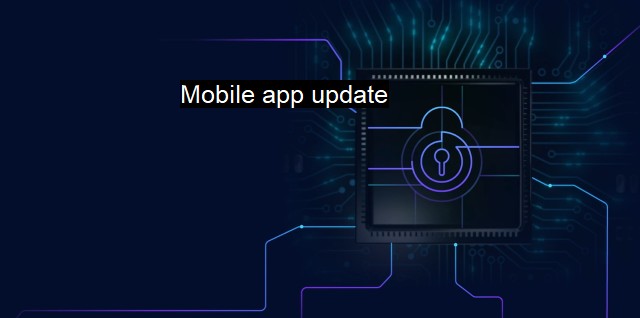What is Mobile app update?
The Importance of Timely and Reliable Mobile App Updates in Today's Cyber-Threat Landscape: Mitigating Vulnerabilities and Improving Device Security
A mobile app update is an essential process that involves enhancing or upgrading an existing application's features, functions, and security protocols.A "mobile app update" is when a developer releases a new version of an existing mobile application. These updates can incorporate new functionalities, repair bugs, or introduce advanced stages of the application. the most critical facet of app updates that deeply relates to cybersecurity and antivirus is security-patching.
In the cybersecurity context, the often-overlooked resort is a mobile app update. Regular app updates are essential because developers constantly identify and address security vulnerabilities in their apps. Once common vulnerabilities are detected, developers build patches, or fixes, to resolve these issues. They incorporate these patches into updated versions of the app, effectively nullifying the vulnerabilities and making the app more secure. This protection from security breaches shield consumers' vital details, protect financial information, and keep sensitive documents safe.
The threats addressed through regular updates include eliminating viruses, spyware, and malware—dangerous elements that are created and disseminated by hackers with the intent to gain unauthorized access or cause damage to users' systems. Viruses inherently have a destructive nature. They erase crucial data, slow down system processes, steal personal data, and can give a hacker full control over a device. More alarming is the advanced breed of viruses that disguises themselves as benign software. In this light, antivirus software needs to be inclusive of app updates to secure mobile systems comprehensively.
Many users are often hesitant to update their mobile apps either due to limited storage space or simply due to a persistent fear of change. Latest updates are often thought to be large in size and can slow down the device or compromise the user experience. declining to update apps regrettably leaves users vulnerable to cyber-attacks. It is like leaving the front door open for hackers who are invariably on the prowl for applications and systems with known and unpatched security vulnerabilities.
In the realms of cybersecurity and antivirus, app developers also use updates to improve the encryption attached to any user data that their app stores or processes. Improved encryption ensures that even if a hacker somehow gains access to a user's data, they won't be able to use it due to encryption. So, updating the mobile applications, standing as the core cybersecurity behavior, significantly decreases the risk of falling victim to cyber threats.
App updates often come with advancements aimed at minimizing any internal weaknesses in the application that could be opportunistically capitalized by malicious parties. developers may code the update to minimize the amount of information required by the app or restrict the access rights of third-party plug-ins, which are common backdoor entry points for hackers.
However benevolent software updates look, routine scrutinization is necessary to prevent any embedded malevolent transactions in the updates that might jeopardize privacy and data security. To assure safe propagation, automatic updates should be performed directly from an app's official developers or trusted distribution platforms.
The mobile app update paradigm is a nidus for innovation and novel functionalities—a soil for mobile growth and development. But more than these gates of possibilities, updates done continuously establish a shifty fortitude against the incessant flux of cyberattacks. These update parameters of security, enabling, suppressing, streamlining, embedding, brew up to a robust flywheel of mobile application security in the cybersecurity and antivirus context. Hence, while reckless downloads and openness to cyber gimmicks can be a bane, conscious awareness, responsible usage of smartphone applications, and regular updates could be the boon.

Mobile app update FAQs
What steps should I take to ensure my mobile app update is secure?
To ensure your mobile app update is secure, first, ensure that you download the update from the official app store or the app's official website. Secondly, read the app's security and privacy policy to understand how the app plans to use your information. Lastly, make sure that your mobile device is running the latest antivirus software to protect against any potential cybersecurity threats.What are the benefits of updating my mobile app for antivirus and cybersecurity purposes?
Updating your mobile app enhances the app's functionality, adds new features, and improves the user experience. Additionally, updates may contain fixes for any security vulnerabilities, ensuring that your mobile device and personal information are protected against malware and cyber attacks.What should I do if I encounter issues after updating my mobile app?
If you encounter any issues after updating your mobile app, first try restarting your device and clearing the app cache. If the issue persists, contact the app developer's customer support team for assistance.Can I decline an app update for cybersecurity reasons?
While you can decline to update your mobile app, it is not advisable for cybersecurity reasons. App updates often contain security patches that address vulnerabilities present in previous versions of the app. By declining to update your app, you are leaving your device and personal information at risk of cyber attacks.| | A | | | B | | | C | | | D | | | E | | | F | | | G | | | H | | | I | | | J | | | K | | | L | | | M | |
| | N | | | O | | | P | | | Q | | | R | | | S | | | T | | | U | | | V | | | W | | | X | | | Y | | | Z | |
| | 1 | | | 2 | | | 3 | | | 4 | | | 7 | | | 8 | | |||||||